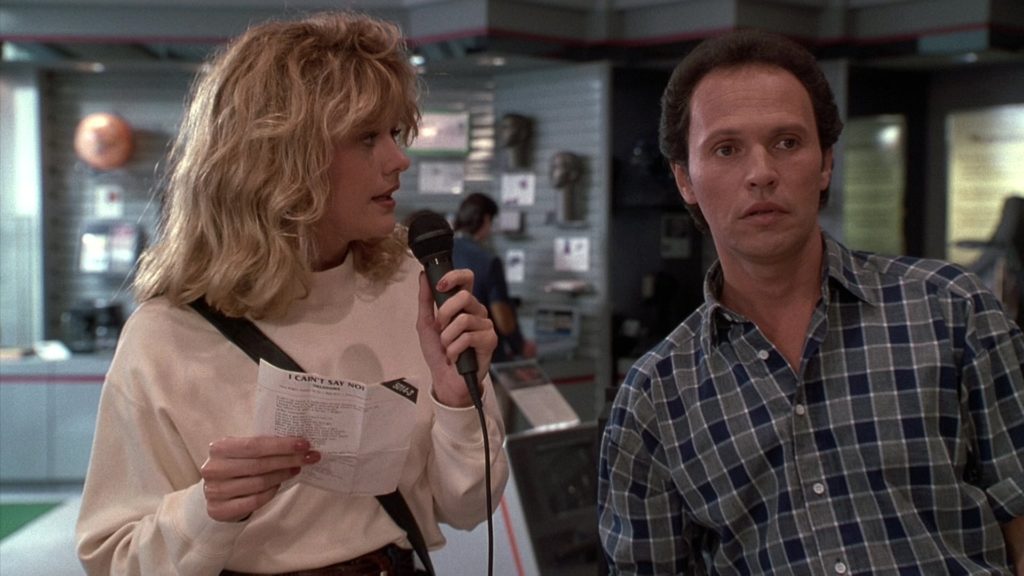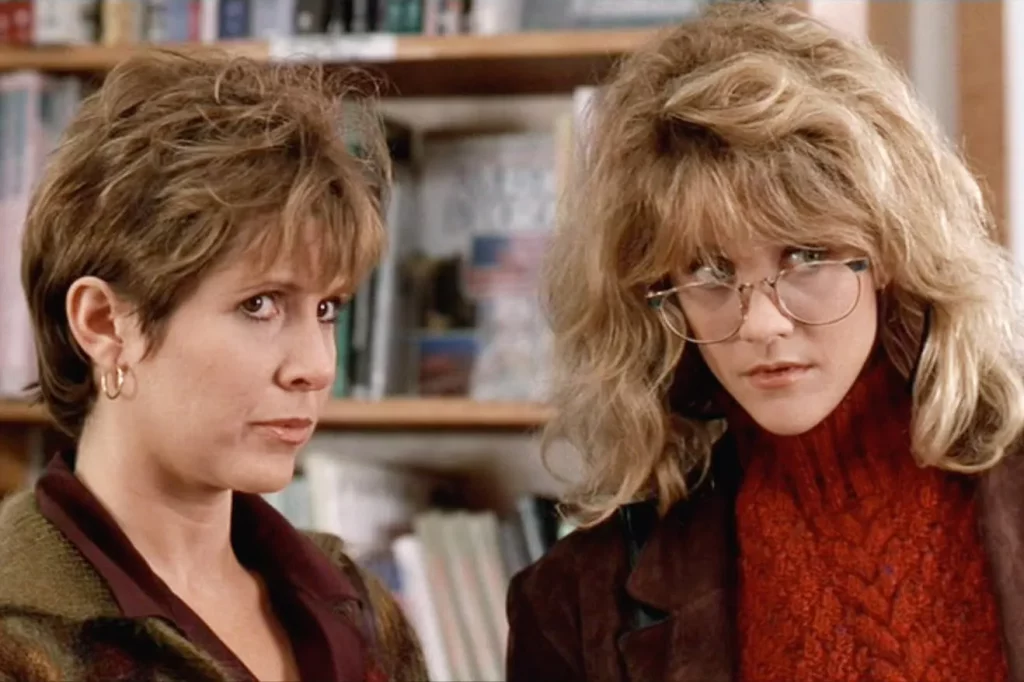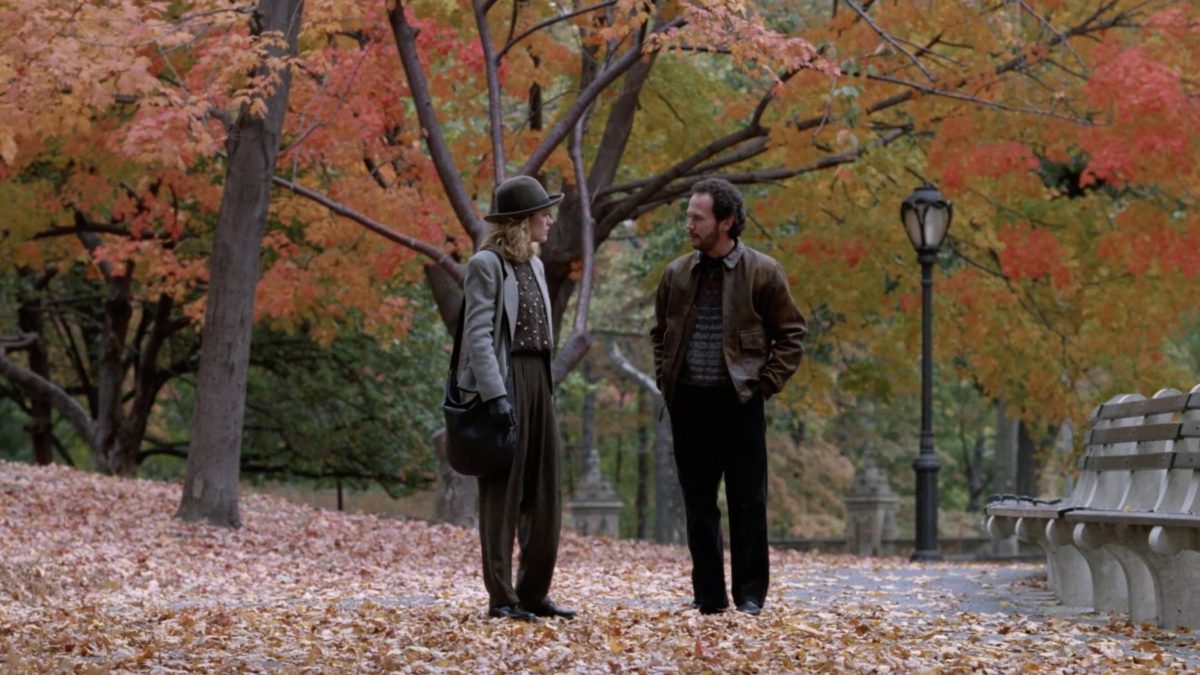"You made a woman meow?"
While not the first-ever example of the “cosmopolitan” romantic comedy, When Harry Met Sally… might be the most influential, and is certainly one of the best. It deserves a lot of credit (and/or blame) for solidifying the modern romcom blueprint: Two upper-middle class people, usually white, usually city-dwellers, whose main barriers to love are bad timing and clashing worldviews that must be reconciled, falling together in a clean arc. Woody Allen pioneered the genre with Annie Hall, and you can probably list a dozen similar specimens without racking your brain too hard.
As you’d guess from the title, the film follows Harry (Billy Crystal) and Sally (Meg Ryan). They start the film as recent college graduates who share a car ride from the University of Chicago to New York City, their hometown. During their journey, they find themselves at odds over Harry’s contentious proposition that men and women can’t maintain a purely platonic friendship if physical attraction enters the equation. She’s a sweet romantic; he’s a brash know-it-all. Over the ensuing years, they continually bump into each other, their paths intersecting at various life stages. At one such meeting, they’re both sick of love and feeling post-breakup blues but looking for companionship, which prompts them to test Harry’s hypothesis.

As their connection solidifies and it starts to feel weird that they’re close but both single, they decide to try and match-make each other with their respective best friends, Jess (Bruno Kirby) and Marie (Carrie Fisher). During the first double date, Jess and Marie fall for each other instead of Harry and Sally, leaving Harry and Sally more dependent than ever on each other’s company.
The remainder of the film captures the slow-burning realization of their feelings for one another, a struggle against the preconceived notions they’ve assigned to each other.
Interwoven throughout the narrative are snippets of interviews with real-life couples sharing their romantic odysseys, lending a layer of depth to the film’s exploration of many unexpected ways romance can creep into our lives.
Nora Ephron is one of the key figures in the evolution of the cosmopolitan romcom both as a writer and, eventually, as a director. When Harry Met Sally… is her second romantic comedy after Mike Nichols’ Heartburn. It’s unmistakably a piece of Ephron’s writing, and the best screenplay by her I’ve seen yet. Yet one of the most interesting aspects of When Harry Met Sally… is that it’s much more than an Ephron solo project; it’s a cross-section of diverse perspectives on romance brought by different creative voices. Ephron and director Rob Reiner birthed the story together, while Crystal provided significant revisions to his character Harry, making him a bit funnier and a shade darker. Ephron and Reiner adored Annie Hall, and Ephron reached out to Allen to touch up parts of the story and script, so his fingerprints are there, too. Some sources even cite the film as a direct adaptation of Annie Hall, but I’ve never seen this officially credited. The resulting story is a diverse exploration of gender and romance that underpins the film’s central questions about how men and women relate.

The chemistry between Crystal and Ryan, obviously a key point in any romantic comedy, is fantastic. Crystal’s characteristic haughtiness, which can easily grate in heavy doses, is offset by an ineffable charm, though your mileage may vary. Meanwhile, Ryan showcases why she’s a romcom powerhouse with a performance both funny and sensitive. They make an irresistible onscreen pair, never sacrificing the tension of their differences but at ease with each other.
Most romcoms are visually unadventurous, even boring, but When Harry Met Sally… is quite attractive. Reiner’s rendition of New York City is infused with the warm hues of autumn and the stark urban beauty of winter. The film’s editing is crisp and efficient, the films 96 minutes flying by.
There are a few problems with the movie, though I’m not convinced they matter. One of them is the damned-if-you-do-damned-if-you-don’t premise. If Harry and Sally end up together, it validates Harry’s initial cynical viewpoint that men and women can’t stay platonic friends, contradicting the rest of the film’s apparent objective to debunk it. On the other hand, if they had remained just friends, the film would have been a downer rather than a crowd-pleaser. Ephron and Reiner’s early draft had them end up friends rather than lovers, but they followed their instincts for a romantic happily ever, and they definitely made the right choice. The film’s enduring popularity and Ephron’s subsequent recognition as titan of the genre is testament to this.

Another of my hangups with the movie is one I’ve had with every Ephron joint: The film’s go-to punchlines and scene conflicts are reductive “men are from Mars, women are from Venus” gags. But I do think When Harry Met Sally… suffers less from this than, say, Sleepless in Seattle thanks to its diverse writing perspectives and its explicit mission to try and deconstruct preconceived notions of gender roles. The fluid nature of the friendship and romance between Harry and Sally is a lot less hacky than it could have been.
It ultimately ends up a minor issue because the movie is drowning in charm and chemistry. When Harry Met Sally… is an outstanding romantic comedy; one of the best I’ve ever seen, in fact, and one I’m right on the edge of bestowing a “Masterpiece” label (maybe next time I watch). Its enduring appeal rests on its well-drawn characters, excellent craft, and unique blend of voices. It’s funny and warm and an all-timer.
Is It Good?
Exceptionally Good (7/8)
Dan is the founder and head critic of The Goods. Follow Dan on Letterboxd. Join the Discord for updates and discussion.


3 replies on “When Harry Met Sally… (1989)”
The GOAT romcom, for me anyway, and it’s not particularly close.
Yeah, it’s a special one. What’s your favorite thing about it?
It just feels so real to me. There’s a lot of wisdom contained in these 96 minutes, and the movie as a whole understands both men and women very well. And there’s a refreshing lack of bitterness in its observations; rather than judge its characters, it simply lets them live, reveals their behavior and viewpoints by the choices they make, and lets you decide how you feel about them.
This isn’t even my kind of thing, typically. (Most of my favorite love stories have unhappy endings.) But “when you decide you want to spend the rest of your life with someone, you want the rest of your life to start as soon as possible” is so damn good.